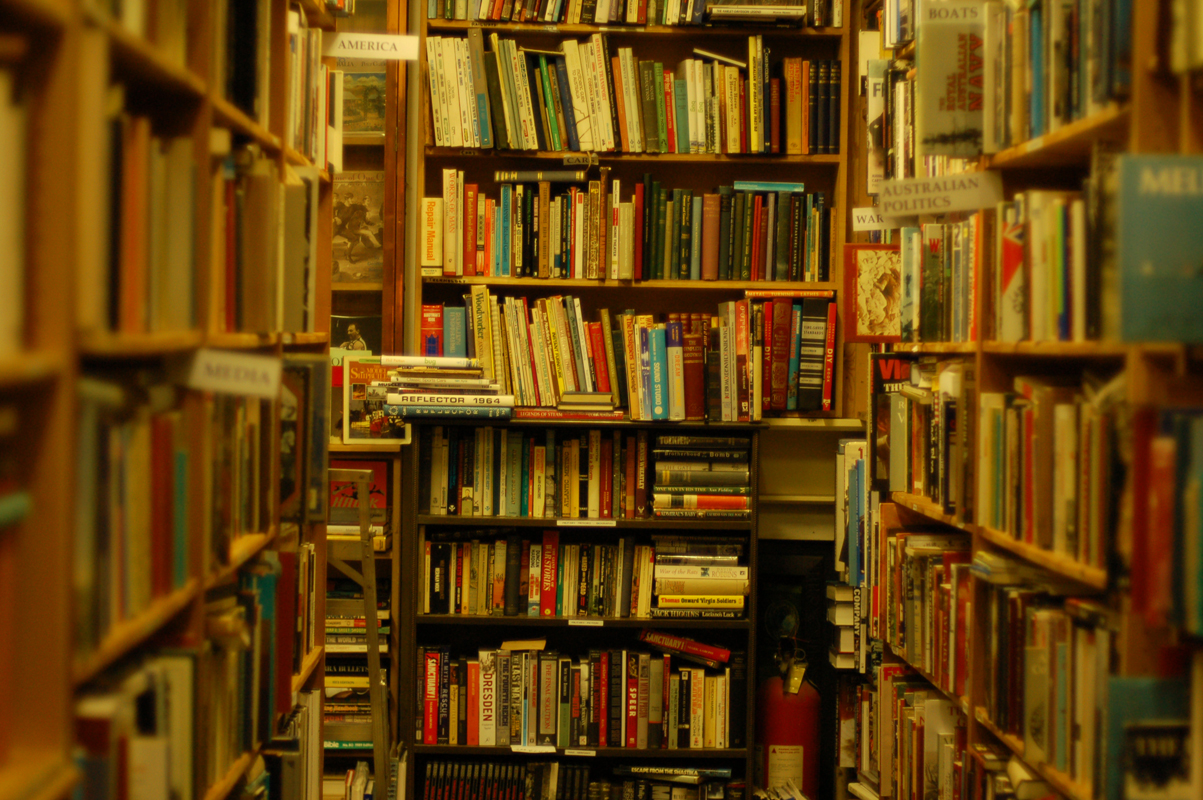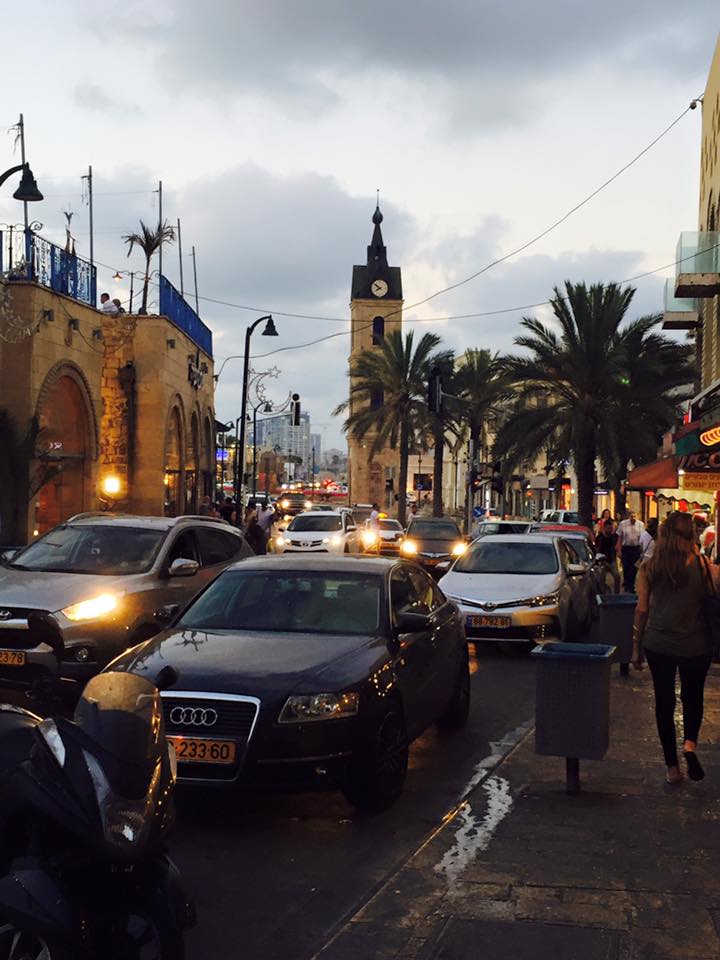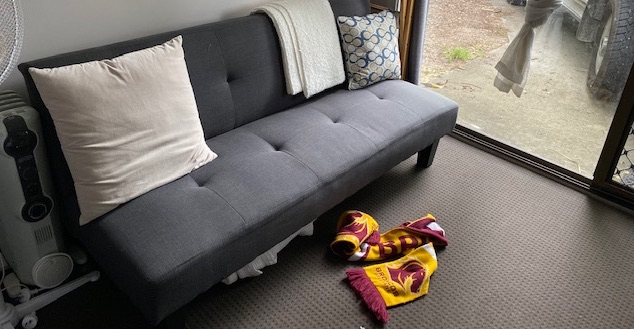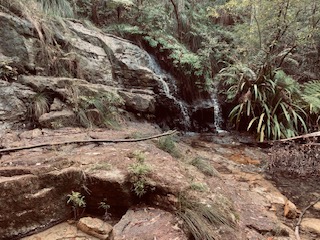It’s dark and still, for just a little while more, nothing moving out there except the cats. Rogue and freeform, they pad along stone pavements ducking under heavily-flowering bougainvillea, spiky trees written bloodshot that yawn over ancient walls and cascade down to the ground below.
I roll over behind shuttered window – glassframe beyond open to the encroaching summer heat – left side numb, not attuned to the feline wander but awakened through an odd juxtaposition of ancient and infant as the former, the salat al-fajr, begins its eerie wail and at almost the same time, the latter, Adeline, stirs at her mother’s breast and rolls, four months alive, onto her back and almost smiles.
We’re halfway across a world as we, two of three of us, awake. From cold to hot, from quiet to loud, from the antipodes to Tel Aviv; a four-month-old girl with the promise of golden curls, myself and Claire, lodging with her brother in digs as alien as they seem familiar.
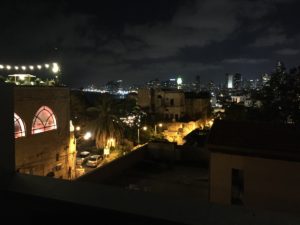 We get here late in the night prior, and despite that, Adeline down, the three of us older ones sit up and drink Israeli beer and talk and the moon traces its silvery path across the desert sky and yet we still talk and drink in each others’ stories and experiences because it’s been a time between meets and each of us thirsts for knowledge of what each other has done in the ensuing time and then, eventually, we sleep.
We get here late in the night prior, and despite that, Adeline down, the three of us older ones sit up and drink Israeli beer and talk and the moon traces its silvery path across the desert sky and yet we still talk and drink in each others’ stories and experiences because it’s been a time between meets and each of us thirsts for knowledge of what each other has done in the ensuing time and then, eventually, we sleep.
***
And so when I awake, my left side is numb because I’ve been propping Claire upright, back to back, so’s she can accommodate the nugget who, since we’ve left home, has ceased to sleep on her own and will only drift off when she’s touching her mother and so both haven’t slept well.
I rise in the dawn light and walk to the bathroom to piss, drink some water. I quickly, noiselessly across richly-rugged marble floor, dress and pull on my battered old Blundstones, moulded to the shape of my feet, and strap on the carrier, thick loop around my waist, pick up Adeline and press her front to mine and encase her in the canvas, loops over my shoulders, a clip in the back to hold it all in place.
Her tiny, white legs hang from the side and tap against my hips as I walk out of the room, her hands gripping the front of my shirt, her head sideways, eyes drooping and she’s asleep again before I’ve made it to the kitchen.
Behind me, Claire has rolled over for the first time all night and is asleep too and will be for hours.
We walk through the kitchen and down the steps to the front door, street level, and haul it open, stepping out onto HaTsorfim, crouching to pick up copies of The Jerusalem Post and the international edition of The New York Times which have been delivered before first light and which I stuff into the back pocket of my shorts lest I have a chance to sit and drink coffee and read while she carries on sleeping (something which, as I discover as we do this over the coming days, never happens as nothing opens early in Tel Aviv, much less the city section of Jaffa, ancient or otherwise).
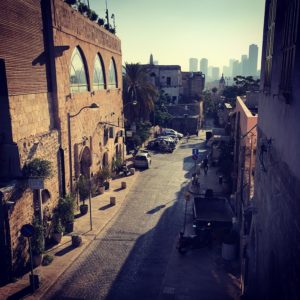 We walk down HaTsorfim, a small single-lane one-way street that passes under old arches and becomes too small for any traffic other than foot – follow the curve past a couple of restaurants, closed at this hour, follow onto Tayelet Mifraz Shlomo directly opposite the Ottoman Empire-era Mahmoudiya Mosque.
We walk down HaTsorfim, a small single-lane one-way street that passes under old arches and becomes too small for any traffic other than foot – follow the curve past a couple of restaurants, closed at this hour, follow onto Tayelet Mifraz Shlomo directly opposite the Ottoman Empire-era Mahmoudiya Mosque.
There’s no traffic, there are no people. The cats have gone. It’s quiet and still, warming up as the sun begins its ascent proper as we walk down Russlan to Retzif HaAliya HaShniya on the foreshore, the deep green-blue of the Mediterranean stretching as far west as I can see. We walk along the stone boardwalk above it all heading south towards the ancient port, her small legs swinging slightly, she turns her head, breathes out loudly, continues to sleep.
As we wander further along the path, watching the sun dance off the water’s surface, on the left the old city rises from the scrubby bluff sloping down from Segev Street, golden stone walls building southward until they’re all-consuming, rising from the cobbled footpath and soaring high, a buttress against the ever-surging sea and whatever and whoever has coursed across it over decades, centuries and centuries.
Now the southern-most part of Tel Aviv, the port section of Jaffa – or Yafo, in Hebrew – was established almost two thousand years BC, built on a high ridge above the water, a site associated with myriad biblical stories, a site of military importance, a bustling centre for trade over the course of the ensuing four thousand years.
Today, in the early morning light, it stands serene, like it’s made peace with whatever has happened in the past, and whatever happens next hardly matters at all.
***
(The week prior, we’d been in England, in Yorkshire, staying with an uncle, and it was here that Adeline had stopped sleeping in the manner to which Claire and I had become accustomed and so I’d been walking early with her for seven or eight days. There though, it’d been along misty country lanes, bordered on both sides by woodland, the sounds of pheasants running through ground growth and pigeons in trees, the odd hare pulsing across verdant fields.
It’d been just as solitary – the two of us, in a place far from home – but as different a setting as one could possibly imagine from the one in which we find ourselves now).
***
At random, I turn into an archway hewn into the yellowed wall and we slowly make our way up stone steps worn smooth by the footfalls of countless people both ancient and modern. We leave the Mediterranean behind us, the smells and sounds of the sea and the greasy green lower walls against which it’s pounded for aeons fading along with the sunlight as we’re encased in shadow, into the gloom, the stairway curving left and upward.
On ledges above, cats now sedentary regard us languidly from under heavily lidded eyes.
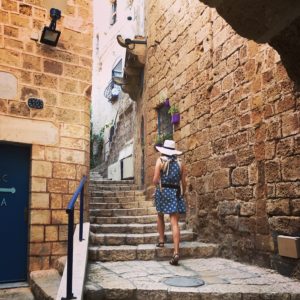 It’s a maze; the steps crest to a landing running back north, more steps head toward the east, another landing above heading three ways. Doors dot the stone leading to small artisan studios, galleries, homes in there too, tiny windows high above with small pots of coloured flowers on the outer sills, the glass behind them open slightly to let in any hint of a breeze.
It’s a maze; the steps crest to a landing running back north, more steps head toward the east, another landing above heading three ways. Doors dot the stone leading to small artisan studios, galleries, homes in there too, tiny windows high above with small pots of coloured flowers on the outer sills, the glass behind them open slightly to let in any hint of a breeze.
(I quietly, as much to break the silence as anything else, describe the surroundings as we – two of three of us, from so far away – pass through places where so many have been before but which to me, and so to her, are of another world and even though she will never remember this, I feel she might need to hear. She sleeps and clutches my shirt, her ear so close to my words and yet so far away.)
We follow landings, go up steps, around corners. We have the place to ourselves, not a soul about. Even though we’re in shade and the stones are cool, I’m sweating but she seems fine, legs still hanging, hands still clutching my shirt. A small flock of birds flutters overhead and land as one high up on a wooden beam jutting from the stone.
We pass the Vatican Embassy, wend our way around about and up, eventually coming to the top and into the Kdumim Square at the Zodiac Signs Fountain, back into the sunlight and the mounting heat, the white stone almost blinding as my eyes readjust. There’s no one up here either, normally a bustling mass of fleshy tourist surge, but at the moment bereft of it all, tranquil.
A breeze in off the ocean cools us for a second and brings with it the sounds of the city awakening below.
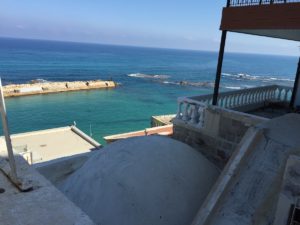 Even though we’ve been turned all about whilst climbing, I have a general idea of which direction is which and we head past St. Peter’s Church and over Segev via the Wishing Bridge, carved with more signs of the Zodiac. I stop and look down the hill now we’re in the open, the crescent moon bay below stretching north, the sea a constantly moving, rippling jewelled sheet. The modern city of Tel Aviv in the middle distance – tall glass towers, reflecting the light and seeming to shimmer – presents in stark juxtaposition to where I’m standing, to where I’ve been walking.
Even though we’ve been turned all about whilst climbing, I have a general idea of which direction is which and we head past St. Peter’s Church and over Segev via the Wishing Bridge, carved with more signs of the Zodiac. I stop and look down the hill now we’re in the open, the crescent moon bay below stretching north, the sea a constantly moving, rippling jewelled sheet. The modern city of Tel Aviv in the middle distance – tall glass towers, reflecting the light and seeming to shimmer – presents in stark juxtaposition to where I’m standing, to where I’ve been walking.
I look for respite from the heat across Abrasha Park, past the Ramses Gate, restored from an archaeological site dating back to the Egyptian ruler’s time in power (not long after this port was first established), and we find palms throwing skinny shade where we stop, and down the hill on the other side we can see the house we’ve come from.
I count the top floor windows from the left and find ours, know Claire is dead asleep behind it, in the cool of the tiled room, away from the sunlight, ever-present now, dancing on the water, the stone, off the pale walls of houses shuttered against the building heat.
I fan the two of us with one of the newspapers pulled from my back pocket. She moves a little, changes the position of her head, the outward breath, keeps sleeping.
I begin to wander down towards HaTsorfim, through the Sha’ar Ra’amses Garden, out into a carpark and onto the street. To the left a little way is the house. To the right, past the end of the street and down an alley is the suspended orange tree, heavy in the morning still, not swaying at all.
We pass across, through a covered side road and wait by Yefet Street, beginning its morning bustle, sloping downward towards Yossi Carmel Square and the clock tower. I dart across and we’re in quiet again, shade by the side of more modern buildings for a block or so, apartments and bodegas, small businesses, some smart, others shabby, flyers pasted haphazard on their front doors, across the glass windows.
All locked, no one here yet, nothing to sell at this hour in this old town. No one here but mounting traffic back across the way, and the two of us, wandering odd streets at an odd time in what seems like an odd city.
I think to myself that it’s probably us who are odd.
For want of something to do with my hands, I gently tap Adeline’s butt through the canvas carrier and she breathes and doesn’t even stir.
We’re in the flea market now, a maze much like the ancient stone web we’ve already made our way through, but flat and in place of stone walls and glass-smooth footstones are endless alleys bordered on both side by cafes and restaurants, open spaces where people are erecting small canvas roofs to escape the sun and protect the wares they’re preparing to sell, odd switchbacks and deadends where nothing seems to be happening until you look closer and see, through small unwashed windows, short rows of tables, another café, somewhere to eat, part of the fabric of this tiny cut of Jaffa.
Alleyways and narrow paths are covered with swathes of coloured cloth, nothing is open and we’re hidden from the sun under the faded blush cover and old, distressed sun-shades stretched across alleys entwine with electrical wires and ornate strands of fairy lights to create a glorious chaos, a melange of old and new painted ochre with desert dust and baked under a middle eastern sun.
I don’t know what the time is at this point, my watch is on the small table next to the bed and I can’t see a clock. It can’t be much earlier than eight, I think to myself, and yet the place is almost deserted.
Nothing starts early in Tel Aviv, and why would it?
***
(Later on, the three of us venture through the market, the maze of small streets, and it’s a different beast entirely, awake and going about its day, gently pulsating, slowly heaving with people both alert and not-so-much. We sit and drink weak coffee under the shade of a faded orange sheet strung across an alley outside a small café, watching the people – young and old, some with children hanging off them, in prams and strapped to chests, men on scooters with cigarettes dangling from lips and mobile phones pressed against their ears, the sound of car horns always on the breeze which comes in from the Mediterranean and becomes a part of the city noise.
Cars and trucks and bikes through the round-about at the clock tower a few blocks down, horns and shouting, street hawkers and people gawking and yelling.
The sound of a city shifting restlessly in the midday heat).
***
As we slowly walk these streets and alleyways, I think to myself how interesting a prospect this is, how almost familiar and yet never quite Jaffa is, how it almost seems like a place I know, a typeof place I know, and yet it never quite makes it there and I then feel like I’m lost somewhere in the world and not a soul – not one who can do anything about it, anyway – knows where I am or what could happen to me.
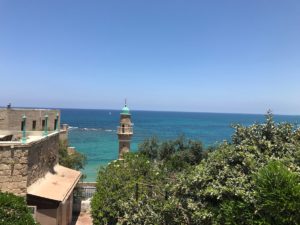 Most likely nothing will happen, and yet this place is indeed as alien as it is familiar. I’ve wandered streets in much the same fashion (sans small child) in various European cities, southern American rural settings, Asian markets and English villages and yet this is New and Different and, with my tiny sleeping charge, exciting and Real and seemingly Raw.
Most likely nothing will happen, and yet this place is indeed as alien as it is familiar. I’ve wandered streets in much the same fashion (sans small child) in various European cities, southern American rural settings, Asian markets and English villages and yet this is New and Different and, with my tiny sleeping charge, exciting and Real and seemingly Raw.
I tell her this, dropping my neck forward so’s my words rustle through the light fuzz that adorns her skull, my eyes still upward, mapping our path ahead. She’ll not remember it, but perhaps she’ll soak it in.
I smile to myself as I gently tap against the canvas, in time with my slow footsteps and she sighs and turns her head again and I see on her cheek, a small imprint of one of the pearl snap-buttons from my shirtfront.
***
We wend our way toward where I think the house is, down new paths and alleys, across actual streets, albeit small ones within the warren – Rabi Khanina, Ami’ad, Rabbi Yohanan, in no particular order – the place gently waking up and coming back to life. I recognise this and that, eventually marking a bodega as one I know if close to Yefet and we find the winding road and wait, traffic building bigger now, and quickly cross onto the shady side, a bit further north and so down HaHalfanim, a foot alley, a trickle of grey water down its centre, out onto the restaurant curve of HaTsorfim and left a couple of small blocks to the front door, digging in my pocket for the key, unlocking and reefing the heavy wooden door open and into the stone cool, up the steps and into the kitchen where I put the kettle on and Adeline wakes up and looks up at me and her blue eyes sparkle like the Mediterranean we’ve just left behind us.
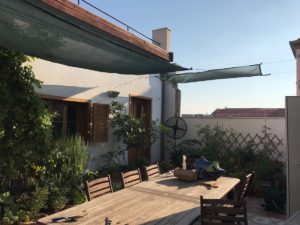 I step out onto the covered terrace, shaded and bordered by myriad plantings, overflowing tomato stems and terracotta pots in long and ungainly formation, a long table, cool tiles underfoot. I unclip the carrier and lay her down on a small blanket and she lies there and waves her legs around and clutches the small, woollen sheep an aunty had given her in the UK.
I step out onto the covered terrace, shaded and bordered by myriad plantings, overflowing tomato stems and terracotta pots in long and ungainly formation, a long table, cool tiles underfoot. I unclip the carrier and lay her down on a small blanket and she lies there and waves her legs around and clutches the small, woollen sheep an aunty had given her in the UK.
I make coffee and spread the papers on the long table and spend more time talking to her about where we’ve just been than reading the news.
She won’t remember any of this.
But, four months alive, she rolls from her side onto her back and smiles.
